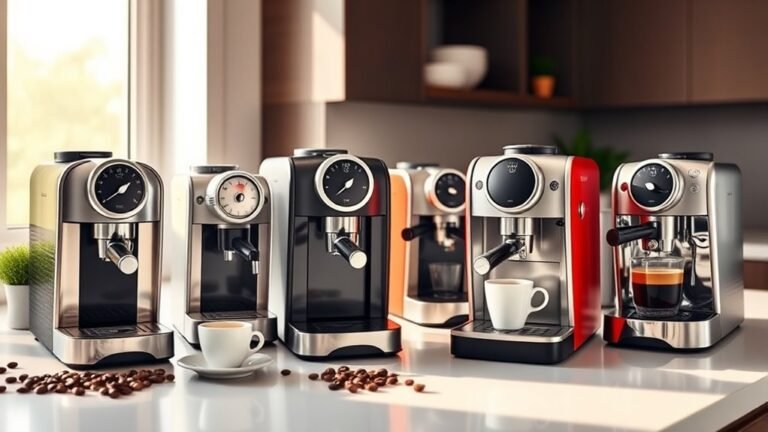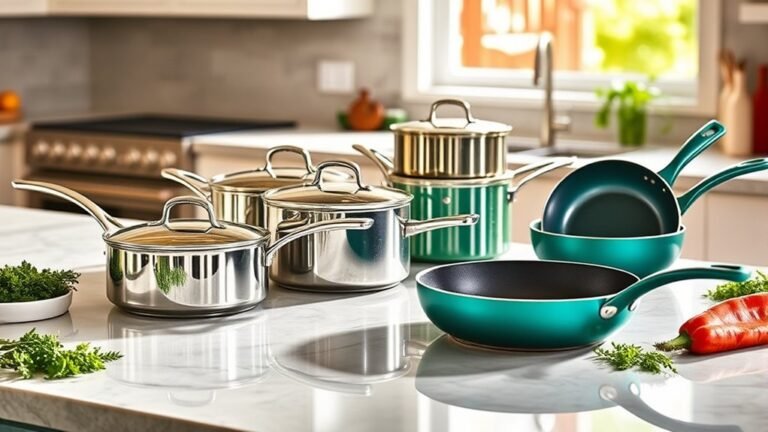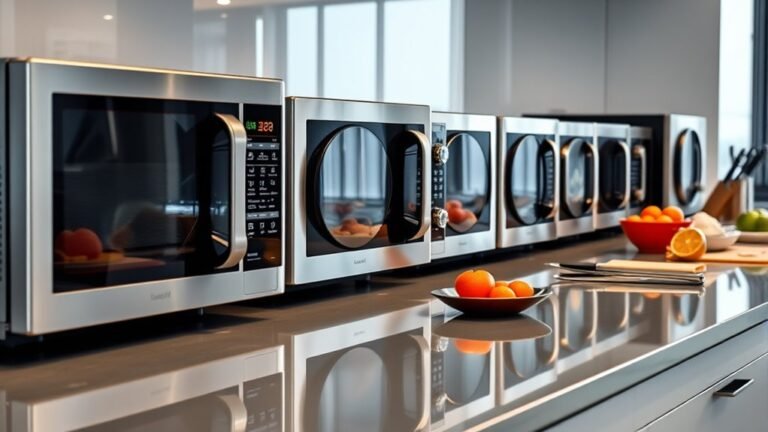3 Best Water Filters for Clean Drinking Water You Can Trust in 2026
When choosing water filters for your home, you want something reliable—filters that remove contaminants like lead, chlorine, and pesticides while preserving beneficial minerals. In 2025, top models stand out for their advanced filtration, ease of installation, and long-lasting performance without wasting water or requiring complex upkeep. Think of these as your health’s silent safeguard—yet, you might wonder which options truly deliver. Let’s explore the most trusted choices that can keep your family’s drinking water both safe and delicious.
Aquasana Under Sink Water Filter System
- Transform Tap Water Into Clean Water - Reduces up to 99% of 78 contaminants including lead, PFAS (specifically PFOA and...
- High Flow Rate - This system powers through a half-gallon of water every minute. No need to wait for clean water...
If you need a simple and reliable under-sink water filter, the Aquasana Under Sink Water Filter System is a good choice. It reduces up to 99% of 78 different contaminants. These include lead, PFOA, PFOS, chlorine, and pesticides. The filter keeps important minerals in your water, so your water is clean and healthy.
The water flows fast—half a gallon every minute—so you don’t have to wait long for clean water. It costs less than 10 cents for each gallon you use. The filters last six months or 600 gallons before needing a replacement.
Installing this system is easy. It has a twist-off housing that doesn’t require professional plumbing. You can set it up yourself, even if you aren’t a plumber. Just twist it on and you’re ready to go—a perfect project for DIY fans.
Best For: People who want an easy-to-install, affordable water filter that removes many bad chemicals and keeps good minerals in the water.
Pros:
- Removes up to 99% of many harmful contaminants
- Fast water flow for quick access
- Simple installation that doesn’t need special tools or plumbing skills
Cons:
- It does not lower total dissolved solids (TDS), which some people might want
- Filters need replacement every six months or after filtering 600 gallons
- Might need some regular cleaning or maintenance to keep it working well
This system offers good water quality in a quick and easy setup. It helps keep your water safe and tasty every day.
iSpring CU-A4 Ultra-Filtration Under Sink Water Filter System
- SUPERIOR PERFORMANCE: The advance 4-stage design, which includes both Ultrafiltration and KDF/GAC stages, removes up to...
- 4-Stage ULTRAFILTRATION SYSTEM: PP Sediment Filter (5 microns) removes larger particles like rust, sand, dirt....
The iSpring CU-A4 Ultra-Filtration Under Sink Water Filter System is a great choice for people who want clean water without much fuss. It uses a four-stage filtration. This means water goes through filters that remove almost 100% of harmful things like chlorine, lead, and heavy metals. At the same time, it keeps important minerals in the water. Unlike reverse osmosis systems, it doesn’t reduce TDS levels, so your water stays balanced.
This system doesn’t waste water and doesn’t need a storage tank. Its tankless design makes it easy to install and keep clean. The filters are simple to change with a quick twist-off. It fits neatly under the sink and doesn’t take up much space. You get fresh, safe water right from your tap, without the mess or big equipment.
Best For: households that want easy, high-quality water purification without waste water or storage tanks.
Pros:
- Removes 99.99% of contaminants while keeping minerals in water
- No tank needed, simple filters to change
- Small size fits easily under most sinks
Cons:
- Doesn’t lower TDS levels like reverse osmosis systems
- Filters need changing every 6 to 12 months, depending on water use
- Only fits under the sink, not portable for other places
This filter system is simple to use and maintain. It gives you clean, fresh water right from your tap with less hassle.
Authentic Tyent Ultra Filter Replacement for ACE-11/13 Water Ionizer
- Advanced Filtration Technology: Taste and experience the revitalizing difference of truly fresh, clean water. Premium...
- High-Capacity Carbon Block Filters: Get continuous access to clean, great-tasting water without the need for frequent...
Are you looking for a water filter that is easy to use and really good at cleaning water? The Authentic Tyent Ultra Filter Replacement made for ACE-11 and ACE-13 Water Ionizers might be just what you need. It uses special technology to remove things like chlorine, dirt, bad gases, and heavy metals. This makes your water safer and better-tasting. The filter’s tiny holes, just 0.01 microns wide, catch most harmful stuff, similar to what kidney dialysis filters do.
These filters last a long time. You can use one for over six months or up to 951 gallons of water. When it’s time to change the filter, the twist-and-lock design makes it simple. You don’t need any tools or special skills to swap it out. This means you can enjoy clean water with little hassle.
Best for: families and people who want an easy, reliable water filter that makes their drinking water safe and tasty.
Pros:
- Removes chlorine, dirt, bad gases, and heavy metals effectively
- Lasts over six months or 951 gallons, so you change it less often
- Easy to install and replace with a simple twist-and-lock
Cons:
- Works only with Tyent ACE-11, ACE-13, and similar models
- Replacement filters may cost more than generic ones
- Needs regular changing every 6+ months for best results
If you want clean, great-tasting water without much work, this filter could be a good choice.
Factors to Consider When Choosing Water Filters for Clean Drinking
When choosing a water filter, you’ll want to consider how well it removes contaminants—factors like chlorine, lead, or pharmaceuticals—to ensure your water is truly clean. You should also look at the filter’s lifespan and cost, balancing ongoing expenses with how often you’ll need replacements. Finally, don’t forget about flow rate and ease of installation; a too-slow filter or a complicated setup can turn your hydration routine into a frustrating puzzle.
Contaminant Removal Efficiency
Have you ever wondered how well a water filter really cleans your drinking water? The truth is, different filters do different jobs. Some are good at taking out heavy metals like lead. Others are better at removing chlorine, pesticides, or many different pollutants. The effectiveness of a filter is usually shown as a percentage. Good filters can remove up to 99.99% of certain contaminants. That sounds impressive, right?
The key to how well a filter works is its pore size. This is measured in microns. Smaller pores can block bacteria, viruses, and tiny particles from getting through. Larger pores may let some of these contaminants pass. You can also look for filters that are certified by groups like NSF or ANSI. These certifications mean the filter meets strict standards for removing contaminants.
Filter Lifespan & Cost
Picking the right water filter is more than just how well it removes bad stuff. You should also think about how long the filter lasts and what it costs over time. Some filters work for six months, while others can last over a year. A filter that lasts longer means you don’t have to replace it as often, which saves you money.
The price per gallon is another important thing. Some systems give you clean water for less than 10 cents a gallon if their filters last a long time. It helps to watch how much your filter can handle and when to change it. This way, you won’t run out of clean water, and you won’t have surprises in your bills.
Choosing a filter with a bigger capacity or strong materials can mean fewer replacements. This keeps your water fresh without costing too much. Good water should be easy to get and affordable. Making the right choice helps you enjoy clean water without stress.
Flow Rate & Convenience
A high flow rate in a water filter means you get clean water quickly. Instead of waiting a long time for water to drip through, you can fill your bottle or glass fast. If your filter can give half a gallon of water each minute, it saves you time. This is great for busy mornings or when you need water fast. Filters that flow quickly are good for homes with many people or small businesses. Look for simple designs, like easy cartridge changes and faucet access. Some filters are tankless, which means they don’t have a large water tank. These give you a continuous flow of water and are even more convenient. Keeping good water pressure makes sure your water stays clean and doesn’t stop unexpectedly. This helps you stay hydrated without any hassle.
Installation Simplicity
Installing a water filter doesn’t have to be hard. Look for filters with push-to-connect fittings or twist-on cartridges. These are quick to install and need no tools. If you want to do it yourself, choose a system made for under-sink use. Make sure it comes with clear, step-by-step instructions. Pick a filter with fewer parts, like pre-attached pieces and fewer filters. This makes putting it together easier. Check that all mounting hardware and guides are in the box. Then, you won’t need to hunt for extra parts or call a plumber. Some filters have built-in, easy-to-access replaceable cartridges. Just pull out the old one and slide in a new one. No need to take the whole system apart. Simple systems save time and make your water filter easy to set up.
Material & Safety Standards
When choosing a water filter, it’s important to check what materials are used. Look for filters that meet safety standards set by NSF or ANSI. These standards show the filter won’t put harmful substances into your water. Pick models made with food-grade, certified materials to keep your water safe and clean. The activated carbon inside should be free from heavy metals and chemicals that can be toxic. Also, make sure the fittings, tubing, and housings are safe. They should prevent leaks and won’t release chemicals over time. It’s a good idea to see if the materials are tested and certified regularly. This proves the filter keeps your water safe and meets health rules. A safe water filter helps you enjoy pure, trustworthy drinking water every day.
Maintenance & Replacement
To keep your water filter working well, you need to do regular maintenance and change parts when needed. Most under-sink filters should be replaced every 6 to 12 months. How often depends on how much water you use and how clean your water is. Changing the filter on time keeps out dirt and germs and makes sure the filter works properly. Some filters have twist-off housings or push-to-connect fittings. These make it easy to change the filter quickly. Using genuine, compatible filters is important. It protects your system from damage and makes sure the filter does its best. Watch your water flow and taste. If the flow slows down or the water tastes different, it might be time to change the filter. Regular checking and changing filters help keep your water tasting good and your system working long-lasting. Taking a little time now can save you problems later.
FAQs
How Often Should I Replace the Filter in My Water Purifier?
You should replace your water filter every 6 to 12 months, depending on usage and water quality. Regular replacements guarantee peak performance, taste, and safety. Check your manufacturer’s guidelines for specific recommendations to maintain clean, healthy water.
What Certifications Ensure the Water Filter’s Safety and Effectiveness?
You want to know what certifications guarantee your water filter’s safety and effectiveness? Look for NSF/ANSI standards, like 42 and 53, and the Water Quality Association’s Gold Seal to make certain of credibility and quality.
Can These Filters Remove Specific Contaminants Like Lead or Pesticides?
You can find filters that specifically target contaminants like lead and pesticides, thanks to advanced filtration technologies such as activated carbon and reverse osmosis. Check product labels and certifications to guarantee they effectively remove these harmful substances from your water.
Are Water Filters Effective Against Viruses and Bacteria?
You ask if water filters fight viruses and bacteria. Many do, especially those with UV or reverse osmosis tech, effectively neutralizing harmful microorganisms, so you can confidently drink safe, clean water without worries about pathogens.
How Do Filters Impact the Taste and Mineral Content of Drinking Water?
You’ll notice filters can improve taste by removing chlorine, sediments, and odors. However, some filters might also strip minerals like calcium and magnesium, potentially altering flavor and mineral content, so choose filters designed to retain essential minerals.

Hi, I’m Liza Jensen, your culinary companion here at Recipe by Liza. 🍳🥗Cooking has always been my passion—I find joy in every whisk, every sizzle, and every aromatic spice. As a home cook and recipe developer, I’ve explored flavors from around the world, creating dishes that warm hearts and tantalize taste buds.Join me on this flavorful journey! Let’s swap kitchen stories, share tips, and celebrate the magic of food together.




